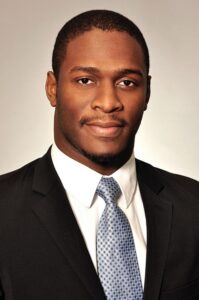Diversifying the Actuarial Profession
A conversation with diversity, equity and inclusion advocate David Guede, ASA, FCA
February 2024Photo: iStock.com/fizkes
Since October 1994, when the International Association of Black Actuaries (IABA) first elected Garth Bernard as its president, its mission has been to increase the number of successful Black actuaries through programs and partnerships that address their underrepresentation in the actuarial profession. For several years, the Society of Actuaries (SOA) has been represented on IABA’s Corporate Advisory Board and has consistently supported initiatives from its annual meeting.

A C+R Research report found that lack of awareness is the biggest barrier for historically marginalized populations to enter the actuarial field. In addition, its research found that late awareness can put candidates at a disadvantage. Therefore, the SOA has partnered with the IABA to assist in creating early awareness of the profession via involvement with its Corporate Advisory Board and the Be An Actuary Initiative.
I interviewed David Guede, ASA, FCA, health actuary at Deloitte Consulting LLP; leader of the Chicago affiliate chapter of IABA; and advocate for diversity, equity and inclusion (DEI). In this interview, David shares his career journey and how the IABA works to help diversify the actuarial profession.
What influenced you to pursue a career as an actuary?
Growing up in Ivory Coast, I had a true passion for scientific subjects such as mathematics, biology and physics. This led me to pursue a scientific stream in high school that focused on these three subjects. Upon graduation, I was determined to continue my studies in these fields and began looking for university programs that aligned with my interests. With the support of my family, I had the opportunity to apply to universities abroad. I found myself landing in a Canadian snowstorm on Christmas Eve, ready to begin an undergraduate degree in mathematics.
During my studies, I realized that getting a degree in pure mathematics likely would lead me toward an academic career. However, I was uncertain if that was the path I wanted to pursue. So I decided to explore professional fields and industries where I could apply my technical knowledge in mathematics more practically to make a tangible impact. Coincidentally, I was taking a life insurance class that semester, which introduced me to the time value of money and the pricing of life insurance products. This was the lightbulb moment for me—that I could leverage and apply the tools and skill set I possessed in the insurance industry as an actuary. It then became clear that a career in the actuarial field was my calling, and I went on to complete my undergraduate degree and obtained a Bachelor of Science in mathematics with a major in actuarial sciences from the University of Montreal.
It is worth noting that it was not until my final year of university that I learned about the significance of taking the actuarial exams. As an international student without professional connections in the actuarial profession, you can imagine how devastating it was to learn that sitting for the exams earlier would have affected my career greatly. This experience inspired me to advocate, on behalf of other international students, for greater awareness and better communication around the requirements to become a credentialed actuary.
You are currently leading the IABA Chicago affiliate chapter. How and why did you join IABA?
I first heard about the IABA from international students who attended the same university as me. Upon further research, I learned that IABA’s mission is to increase the number of successful Black actuaries through programs and partnerships that address their underrepresentation in the profession. What resonated with me most was IABA’s vision of equitable exposure, access, development and advancement for Black people within the actuarial profession. This vision struck a chord with my own journey of discovering the actuarial profession and embarking on the road to becoming an actuary.
In 2019, while working as a health actuary in Toronto, I was approached by Gloria Asare, FCAS, MAAA, a longtime member of IABA who was looking to create the first city affiliate outside of the United States. I was thrilled to be a part of expanding the mission, vision and, most importantly, impact of IABA to actuarial students and professionals in Canada. Two new city affiliates were established that year in Toronto and Montreal. This was also made possible thanks to the strong support of Ben Marshall, FSA, MAAA, FCIA, CERA, Canadian staff fellow of the SOA. He generously journeyed with us from the beginning, leveraging his knowledge of the actuarial landscape in Canada to connect us to actuarial organizations.
A year later, I became the co-lead of the Toronto affiliate chapter with Gloria. In this new role, I was interacting and collaborating with corporate partners, actuarial organizations (such as the SOA and the Canadian Institute of Actuaries [CIA]) and universities to establish strategic partnerships in the form of professional development and networking events, as well as university and high school outreach to raise awareness about the actuarial field among Black youth. After relocating to Chicago, I was asked to take on a new role as leader of the Chicago affiliate chapter.
Today, my amazing friends Kimaada Boyce, ASA, ACIA, and Valérie Adelson, FSA, FCIA, respectively lead the affiliates in Toronto and Montreal. Both are both passionate and dedicated to serving the local IABA members.
How has IABA affected you both professionally and personally?
On a professional level, volunteering with IABA has given me the opportunity to connect with many talented actuaries who have shaped my career. On a personal level, I have seen how important it is to have support from others along your personal and professional journey—from my family who helped me pursue my education abroad to the generous teachers, mentors and friends whom I have met through my studies and professional career.
Learn More about the IABA
For information on the International Association of Black Actuaries, please visit blackactuaries.org or email iaba@blackactuaries.org.
I always am seeking to help actuarial candidates reach their full potential, whether it is providing advice on how to prepare for exams or job interviews, connecting them to other seasoned actuaries, sharing the many programs that IABA offers or simply being a friend.
How do you believe the work of IABA has influenced and assisted in diversifying the actuarial profession?
The impact of IABA on the actuarial profession cannot be overstated. Through my involvement, I witnessed firsthand the impact it can have on students and young professionals as they learn about the field and build new professional networks.
IABA’s strong partnerships with schools and companies have resulted in students having greater awareness of the field and how they can prepare for it. This early awareness is crucial for Black students who may experience a delayed start in the exam process. IABA plays a vital role in influencing the field through professional development, recruiting and hiring opportunities.
With Black actuaries making up less than 3% of all fully credentialed actuaries across North America, according to SOA, Casualty Actuarial Society (CAS) and CIA self-reported demographic data (SOA, 2.8% [U.S. membership, with 39% self-reporting]; CAS, 1.5% [U.S. membership, with 78% self-reporting]; and CIA, 2.5% [based on total membership, with 13% self-reporting]), IABA is playing an essential part in raising awareness with partner actuarial organizations. This, in turn, better informs their internal DEI programs to ensure that there is a better representation of Black professionals across different levels within these organizations. This is key to laying a stronger foundation for greater long-term diversity in the field well into the future.
How can companies support the mission of IABA and create an inclusive environment for diverse actuaries?
I truly believe that actuarial employers have the capacity to drive meaningful change. Through targeted initiatives, the impact can extend beyond internal employees and reach external customers. Actuarial organizations that provide education and research on behalf of the profession also can play an important role and increasingly are doing so.
Fostering workplace diversity is essential to remain relevant and drive innovation in a globalized economy. Even small, incremental changes aimed at creating an inclusive environment can yield tangible and long-lasting outcomes. Steps like ensuring transparent and equitable promotion, providing continuous growth opportunities and support for Black actuaries, and establishing mechanisms to measure the progress toward goals and hold all levels of management accountable are key. It is important that these actions are ingrained in an organization’s ongoing culture and operations rather than being driven solely by the current news cycle.
I’m fortunate to work for a great organization such as Deloitte that is intentional about creating such an inclusive environment. Deloitte has been at the forefront of DEI and implemented programs that allow every practitioner to feel valued, heard and able to show up as their authentic self in the workplace.
Statements of fact and opinions expressed herein are those of the individual authors and are not necessarily those of the Society of Actuaries or the respective authors’ employers.
Copyright © 2024 by the Society of Actuaries, Chicago, Illinois.

